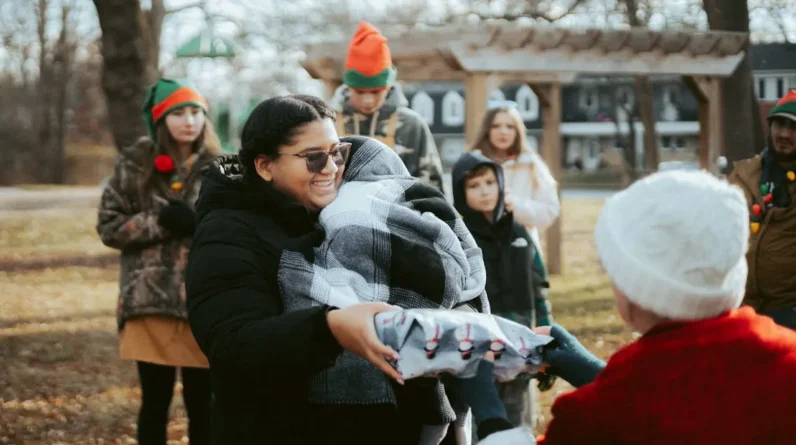
If you struggle with social anxiety and fear, you need to know that you are not alone.
This time of year can feel exhausting, overwhelming and extremely stressful for so many people, but especially for those who worry about being put in social situations like:
- work parties
- busy family get togethers
- noisy public spaces full of people
Many people have social anxiety, ranging from mild to extreme. Some are diagnosed with an anxiety disorder, but plenty of people aren’t. They may not fit the criteria or choose not to reach out for professional help.
Regardless of how much social anxiety you struggle with, there is good news. There are many tips, tricks, and techniques that can help you increase your social skills and decrease your anxiety about social situations in general.
Do you need support with your feelings of anxiety? Read this next: 5 Best Online Anxiety Support Groups to Calm Down Your Mind
5 Tips to Help You With Social Anxiety
1. Practice conversations in your head.
A great way to start facing the fear of socializing is to practice starting a conversation with people. This may sound challenging, but I assure you that every conversation that you start will become easier and easier!
The first thing that you can do is prepare yourself for this exercise. Using visualization techniques is a wonderful way to begin your journey to anxiety-free conversations. Here’s how it works:
- Sit in a comfortable spot and take a few deep breaths
- Begin to visualize yourself walking up to someone you know – or a stranger
Scenarios to start with could be:
- something that could come up at work
- at the checkout line in a store
- while you’re out walking in your neighborhood
Then:
- See yourself comfortably initiating a conversation and carrying the conversation for about 10 to 30 seconds
- Do this mental exercise over and over until you’ve seen yourself initiate a handful of conversations
2. Know what you want to talk about.
Think about a few topics you can initiate conversation with.
Start with something easy and a little personal, like that person’s jewelry, hair style or clothing.
You can say something like:
- “Wow, I really like that sweater!”
- or “Your necklace is beautiful!”
You can even use the common conversation starter by talking about the weather. Once you make a comment, relax and let them respond. Then, you can follow up with something else to say that can build into a conversation.
For example, if you like someone’s hair, let them know.
Once they respond, you could ask a question that could start a conversation like,
“I’ve always wanted to try that hairstyle, but I never had enough courage to go that bold. Who is your hairdresser?”
Then, see where the conversation leads.
You can increase your social skills by practicing these conversation starters and building up self-confidence. Practice in front of a mirror, with a friend or partner, or just rehearse in your head until you feel more confident.
If it doesn’t go as planned, try to let it go. Everyone has to contend with conversations that don’t go as planned. You just brush it off and move on with a smile.
Sometimes, social anxiety triggers come from not knowing the other person well enough to get a conversation going.
Simply ask them questions to get going, and once you learn more about them, the conversation can flow more easily.
3. Building confidence helps with socialization skills.
If you build your confidence, you will be able to socialize much more easily.
Those who cannot socialize as well as they’d like may have had a bad experience while growing up and the effects from that carry over into adulthood.
For example, if a child tries to socialize with kids at school and is made fun of for how they act or what they say, that can create a feeling of rejection, and that child may become insecure in socializing.
As a result, they may shy away from situations in which socialization occurs and not develop the necessary skills for adequate conversation skills as an adult.
Building confidence at any age is possible. I know what it’s like to be afraid and insecure at the thought of having to converse with people. But I also know that with hard work and determination, confidence and socialization skills can be learned.
4. Try positive affirmations.
A great way to become more confident is to recite positive affirmations out loud daily. Positive affirmations are simply statements that are positive and encouraging – about what you want to become in your life.
Visit our Daily Affirmations page to boost your confidence and encourage you to keep trying!
Let’s say you want to be more confident and social. You can write out statements that reflect this to be true and read them daily. Post them in a spot where you’ll be continually reminded to speak them.
Here are a few examples of what you can write:
- “I am very confident in my ability to converse openly and effortlessly.”
- “People like me because I am friendly and likeable.”
- “I have favor wherever I go.”
- “My socialization skills are improving all the time.”
- “I have so much to offer in a relationship.”
- “It’s alright if conversations don’t go as planned. It’s not a big deal.”
You can write as many positive affirmations as you’d like. Involve all areas of your life and really be proactive in building your confidence.
5. Give yourself options.
Another great way to build confidence is to get out there and get involved in something that entails you having to interact with people.
Volunteer, join a club, or find a hobby.
The more you put yourself in social situations, the more you’ll be forced to work on your confidence and socialization skills. Joining groups will also give you more to talk about, and you now have something in common with the person you want to approach.
Social Anxiety: You Can Become More Confident and Social
It simply takes effort and time on your part!
Believe in yourself and give yourself time to learn better socialization skills. It’s taken me years to get more comfortable socializing, but the time and effort has been well worth it.
Editor’s note: This article was originally published Aug 2, 2021 and has been updated to improve reader experience.
Photo by Vladimir Fedotov on Unsplash







